AMABHUNGANE
Taxi ‘mafia’ blamed for deadly attacks on long-distance buses, police urged to act
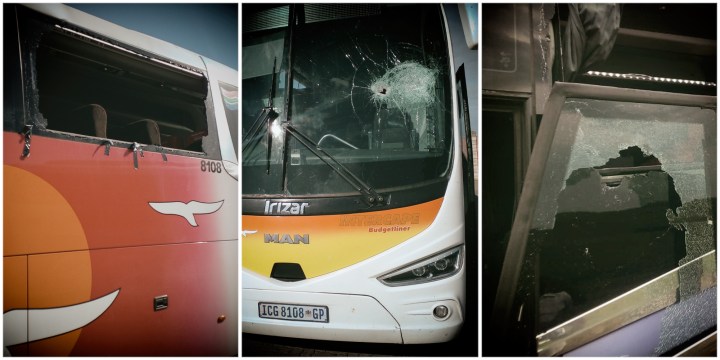
As bloodshed and intimidation mar the long-distance transport sector, bus company Intercape has pointed fingers at taxi bosses, accusing them of sustained mafia-style tactics and attempts at price-fixing — while the authorities, Intercape alleges, did little or nothing.
On 25 April 2022, as an Intercape bus slowly exited its Cape Town Industria depot, an unidentified man calmly walked towards it and fired over a dozen bullets at the bus before fleeing.
Video footage from inside the bus shows the driver and another man scrambling for cover while the bus is still in motion, then frantically trying to open the doors. Blood is visible on the driver’s clothes and bus seats.
Four days after that attack, the 35-year-old bus driver, Bangikhaya Machana, died of his injuries. Machana’s killing comes amid endemic violence targeting long-distance bus operators in the Eastern Cape, Western Cape and Gauteng.
Bus operators allege that minibus taxi associations are behind the violence that has escalated in recent months, and say that disputes over routes and fares are at the heart of the conflict.
Between January 2021 and February 2022, over 150 incidents of shootings, stonings and other acts of violence and intimidation directed at bus drivers and passengers were reported to the South African Police Service (SAPS) in the three provinces.
Bus operators claim that police inaction has led to further bloodshed.
In a sworn affidavit submitted by Intercape chief executive Johann Ferreira to SAPS for the purpose of opening a criminal case, he detailed how, over the past five years, taxi associations have allegedly tormented Intercape staff, destroyed their property and attempted to extort money directly from him and other bus operators.
He accuses taxi associations of resorting to mafia-style tactics.
He wrote of Machana’s murder, “A man was shot in cold blood while simply doing his work. On 28 April 2022 his family was left behind, alone. That man died. The cause: taxi violence.”
In Idutywa, Machana’s family is still reeling. His father, Nkululo Machana, said he was elated when his son was employed at Intercape in June 2021. He says Bangikhaya immediately began paying the costs of educating his seven sisters.
“Our joy as a family was short-lived because now his sisters are back to suffering because we don’t have money for their school transport. He also left a wife and two children behind and we don’t have money for them,” said Machana.
Machana also criticised the police for failing to arrest his son’s killers.
“We have been told that the people who did this were caught on camera but not a single person has called me and told me about an arrest. I am very upset that my child’s killer roams free.”
Protection racket
Ferreira’s affidavit raises the spectre of another formal industry falling prey to what amounts to an organised protection racket, similar to those that have plagued the construction and mining sectors.
Ferreira said the Covid lockdown and banning of interprovincial travel brought financial pressure on the whole transport sector and heightened tensions.
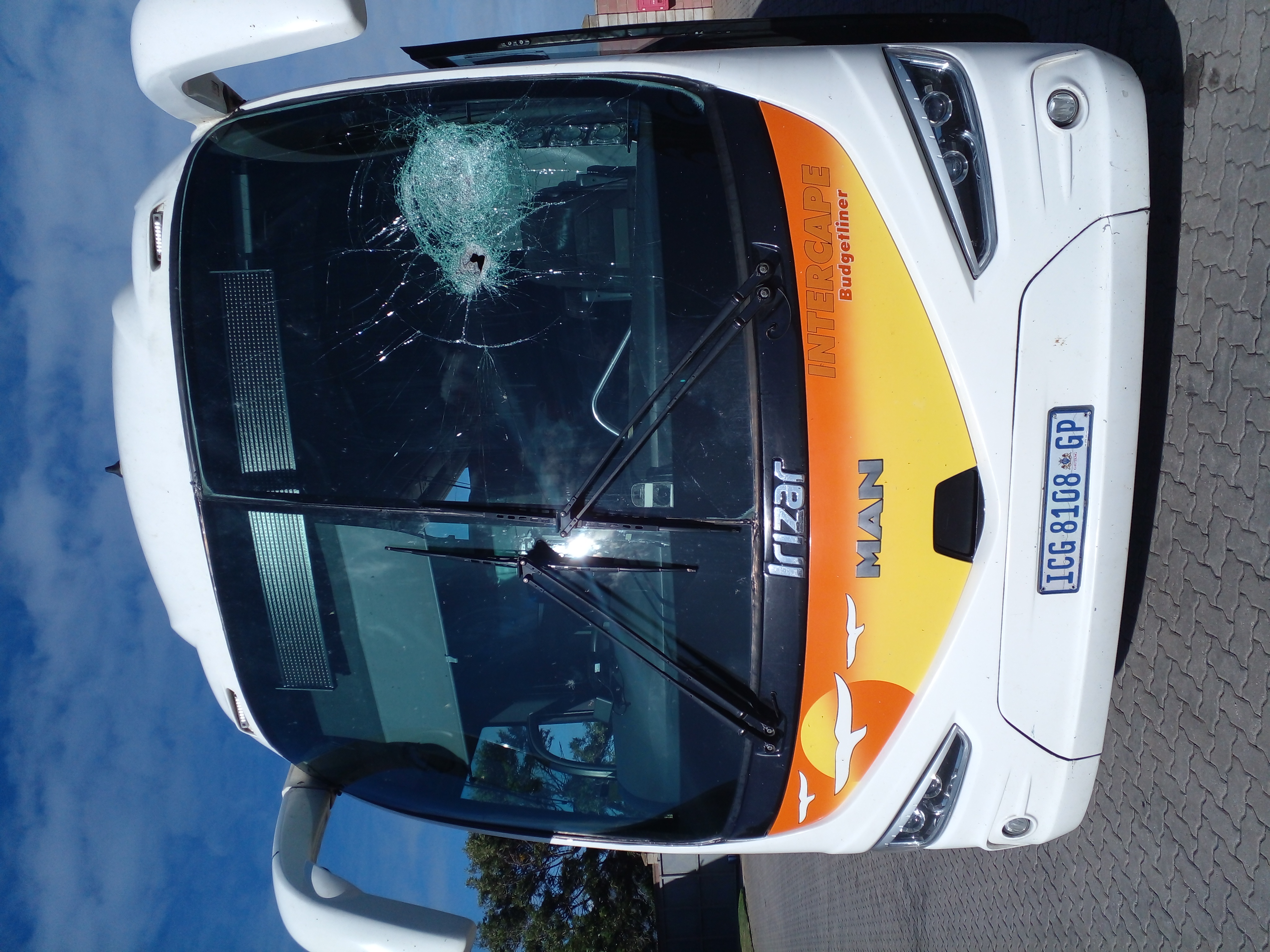
Bus operators allege that minibus taxi associations are behind the violence that has escalated in recent months. These images depict the results of incidents in the Eastern Cape and Cape Town. (Photos: Supplied)
He alleges that since the lifting of the travel ban, members of taxi associations, including the Cape Organisation for the Democratic Taxi Association (Codeta), Uncedo Taxi Association, Border Alliance and Cape Amalgamated Taxi Association, have intensified their attacks and prevented passengers from using buses.
“Presently, throughout the Eastern Cape, the Intercape buses are harassed by these taxi associations on a daily basis. Our bus drivers are prevented from offloading or collecting passengers at the designated areas and often have to drive to the next town in order to collect passengers or offload passengers.
“From February 2022, the only manner in which to safely embark and disembark passengers in certain towns was to do so at police stations,” Ferreira wrote.
He alleged that during these incidents of violence and intimidation, Intercape officials would contact the local police to assist: “Often police officers would attend at the scene and simply fail to intervene. In fact, there have been occasions when police officers witness the intimidation tactics without taking any steps to stop this unlawful conduct.”
He said things escalated to a point where passengers could not embark or disembark at certain towns, forcing passengers to take a taxi to the next town in order to be able to board the bus.
“At the initial stages of conflict, the perpetrators demanded to see the operating licences of the buses before they would allow passengers to embark or disembark.
“When Intercape refused to participate in any agreement with the taxi associations, they started attacking the buses by stoning and shooting at them. The stoning and shooting got so bad that Intercape stopped servicing certain areas, particularly the route between Queenstown and Mthatha.
A separate affidavit by an Intercape manager describes how, on 12 April 2022, members of Cape Town-based Codeta allegedly stormed Intercape’s Cape Town Station office and threatened staff and passengers, preventing them from boarding their buses.
“They were saying, if they go inside the bus they will start a war, so passengers stood for almost two hours. They said they have been arrested before and are not afraid of the police and blood will be shed,” said the office manager, who requested anonymity for fear of intimidation.
AmaBhungane understands that the SAPS recorded this alleged intimidation.
A SAPS incident log book attached to Ferreira’s affidavit quotes an incident report by a Lieutenant-Colonel Tumene who was at the scene:
“Together with Captain Gerner and CPU members attended to a complaint of long buses being blocked by taxi drivers. Allegations were that an agreement was reached in a meeting in East London that Intercape will only use two buses transporting people of which Intercape is breaching the agreement. On requesting the agreement there was none and Mr Ferreira disputed any agreement of such nature.” (sic)
In his affidavit, Ferreira said the officers “failed to arrest these trespassers” who were also “infringing the safety of the public”.
A day after this incident, on 13 April 2022, a meeting was held, at Signature Hotel in Cape Town, between taxi associations and bus operators, represented through their newly formed association, the South African Long Distance Coaches Organisation (SALDCO).
Ferreira said he and all the other 15 bus companies represented by SALDCO attended in hope of reaching a peaceful solution with the taxi associations, but claimed they were threatened again.
“The taxi association representatives told us in no uncertain terms that in the event that we did not give in to their demands, they would involve every single taxi association in South Africa in their campaign against long-distance bus operators,” said Ferreira.
Taxi associations have rejected claims they were behind the violence.
Codeta spokesperson Andile Khanyi denied they threatened Intercape staff. He said although the taxi association holds a long-distance operating licence, it services the route between Khayelitsha and Cape Town, which does not clash with that of Intercape, so there was no motive to attack.
Khanyi said Codeta was “well disciplined”.
“Here in Cape Town, nobody from Codeta went to Intercape offices and threatened anybody,” he said.
Speaking on behalf of the Eastern Cape-based Border Alliance Taxi Association, chairperson Gabs Matshala denied the alleged threats and extortion claims. He claimed to have been invited to the meeting by the bus associations on an all-expenses-paid trip.
Ferreira told amaBhungane that all the bus companies were pressured into paying for Matshala’s travel expenses.
SALDCO secretary, Mzukisi Dyasi, initially confirmed Ferreira’s version of events, but later said that SALDCO still wanted to “investigate the veracity of the allegations made by Gabs”.
He added, “Due to the sensitivity of the issues and in order to prevent any future violence we will not be commenting on the issues.”
Ferreira has also claimed there were attempts by senior figures from the taxi associations to extort money directly from Intercape. He says he was told that in order to “make the problem go away”, all Intercape had to do was pay.
Less than two weeks after the Signature Hotel meeting, Bangikhaya Machana was fatally shot in the Industria depot attack.
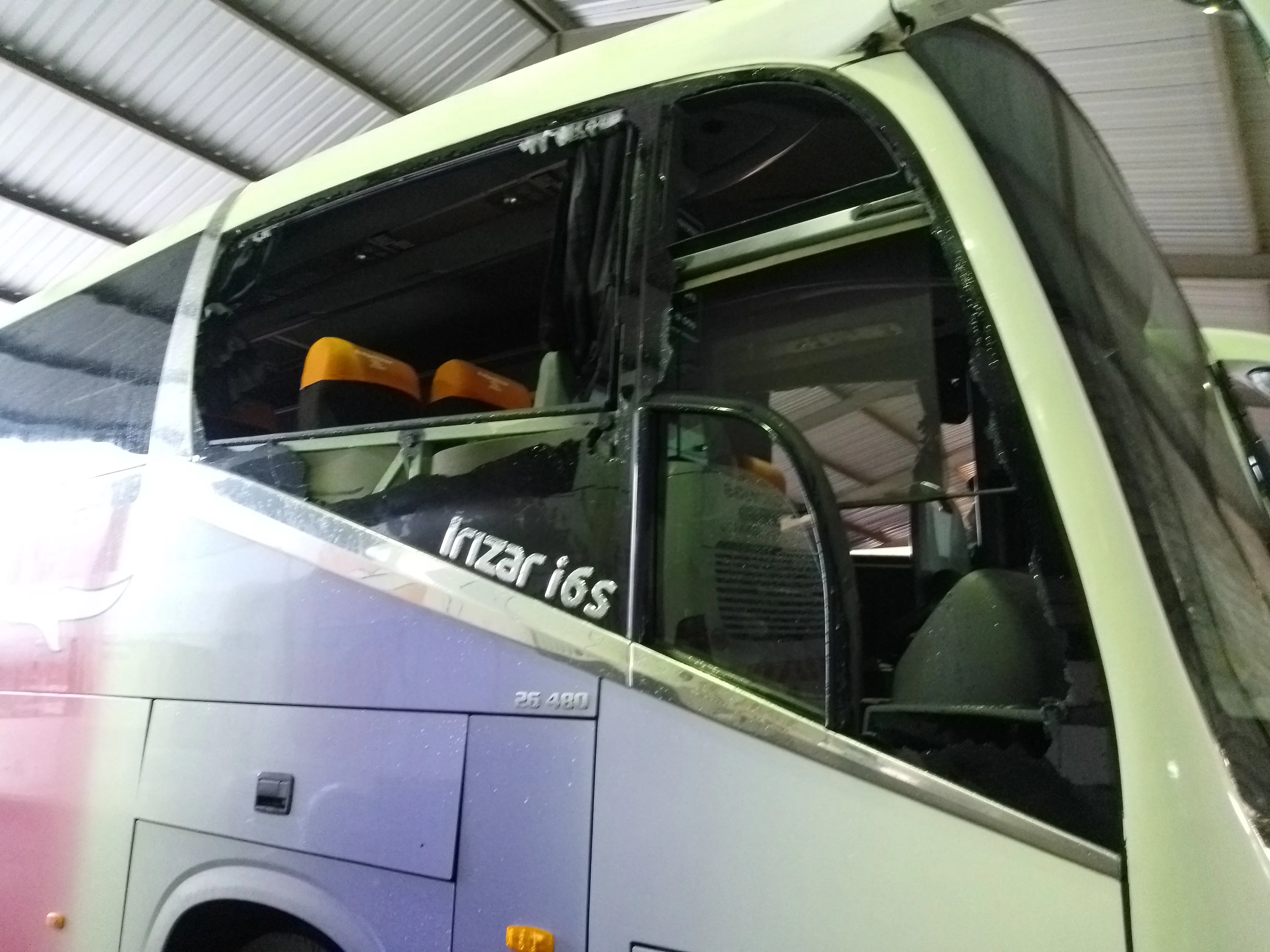
Bus operators allege that minibus taxi associations are behind the violence that has escalated in recent months. These images depict the results of incidents in the Eastern Cape and Cape Town. (Photos: Supplied)
Khanyi distanced his association from the shooting and said, “If it was someone from Codeta or one of the members, why was the person not arrested?”
Border Alliance’s Gabs Matshala, while denying that he or any of his association’s members were behind the attacks, singled out Intercape, claiming the association had a good relationship with all bus companies except Intercape.
He accused Intercape of trying to monopolise the industry by squeezing out other bus operators and the taxi industry.
“The reality is that there are two camps, Intercape on this side alone [versus] other bus companies and taxis,” he said.
Before withdrawing their comments, SALDCO disputed the claim that Intercape stood alone in its fight with the taxi associations, telling amaBhungane they believed the associations were engaging in criminal measures, including extortion, to try to dictate how the long-distance bus companies should operate.
National spokesperson for SAPS, Athlander Mathe, said the police could not comment on the violence as investigations were still underway.
A string of incidents
A dossier compiled by Ferreira suggests that attacks on long-distance bus operators have escalated alarmingly.
The dossier contains pictures of buses with shattered windows and bullet holes, pictures of injured drivers and passengers, taxis blocking roads, and what appear to be taxi association members forcing their way onto buses.
Ferreira said contestation over routes, and in particular the issuing of long-distance licences, triggered the now longstanding conflict, which first arose in Butterworth in the Eastern Cape.
In his affidavit, he says Covid exacerbated the taxi violence: “As a result of the various lockdowns and lack of tourists, in order to continue their business operations, long distance bus operators have had to slowly decrease their prices.
“This is a natural consequence when there is a lack of demand. From 2021, when it became clear that long-distance bus operators were charging similar rates as taxis, there has been a marked increase in violent incidents and in the severity of the taxi associations’ demands.”
Minutes from a series of meetings held between taxi associations and bus operators during 2020, reveal the bullying tactics of the taxi associations.
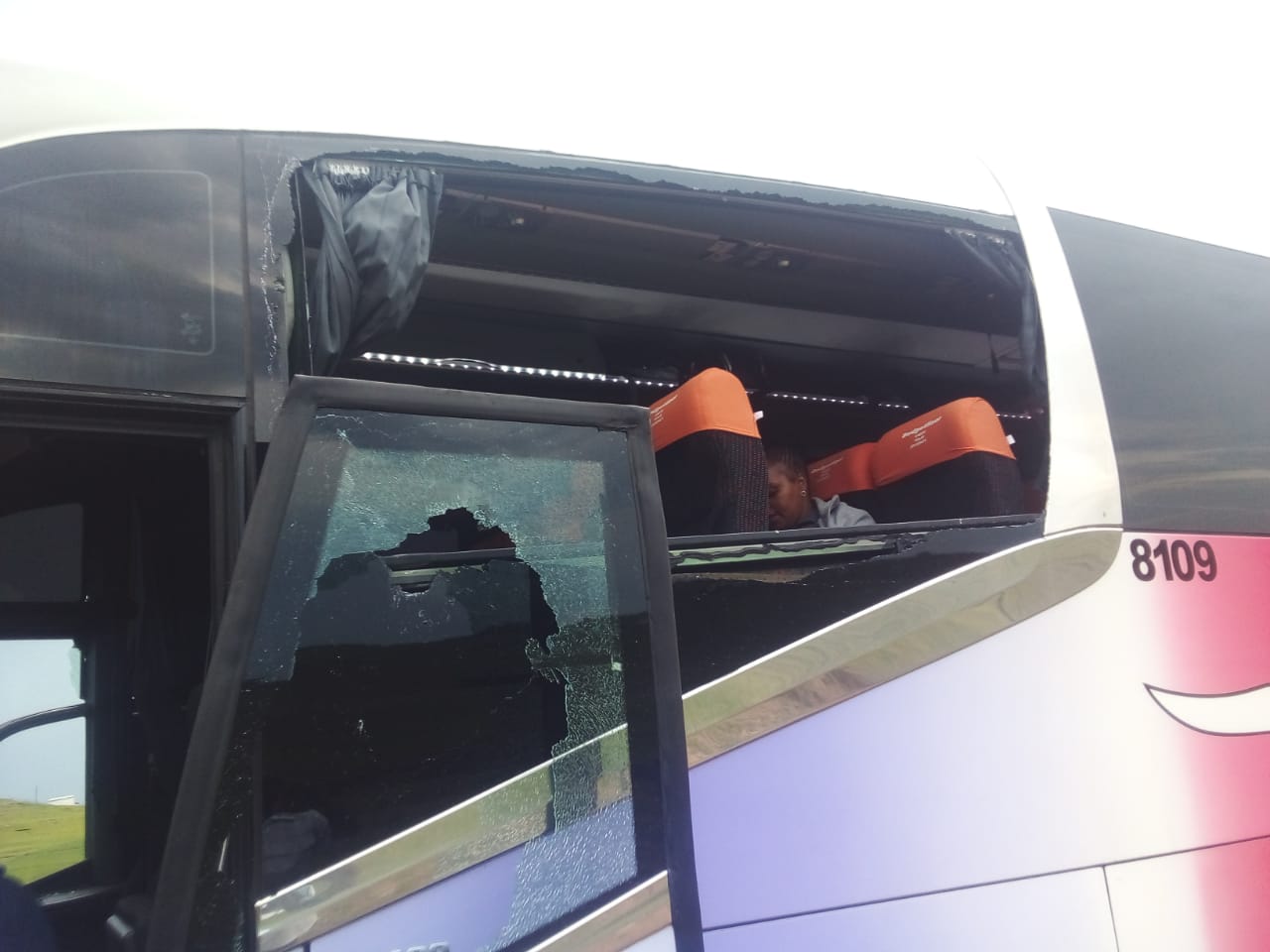
Bus operators allege that minibus taxi associations are behind the violence that has escalated in recent months. These images depict the results of incidents in the Eastern Cape and Cape Town. (Photos: Supplied)
Among other demands, they want buses to pay a cash levy for using particular routes, restrict the number of buses operating daily and amend bus operating licences to reflect a timetable acceptable to the taxi associations.
According to Ferreira, his company and drivers hold various interprovincial operating licences issued by the relevant authorities in terms of the National Land Transport Act (NLTA). These operating licences permit the loading and offloading of passengers at designated stops across the country.
When taxi associations force drivers to do drop-offs at alternative stops, they are essentially forcing bus operators to break the law and contravene the regulations of the NLTA. Operators could lose their licenses as a consequence.
Price fixing
The act of competitors coming together and agreeing to lower or raise prices is defined as horizontal price fixing. Under South Africa’s Competition Act, this is illegal.
Despite this, it seems a meeting was held in Kokstad on 15 March 2021 between bus operators, taxi associations, officials from the Department of Transport (DOT) and the SAPS.
In the meeting, which Ferreira said he did not attend but was briefed on by other bus operators, an agreement on fares was apparently reached. One of Ferreira’s managers insisted at a subsequent meeting on 8 April 2021 that it be placed on record that Intercape would not participate in price fixing as it was against the law.
Attacks escalated.
Ferreira’s affidavit states: “On 15 April 2021, it is recorded that since no agreement was reached, buses would not be allowed to load people. On 24 May 2021 at Ladysmith, one of the Intercape buses was stoned and a rock went through the windscreen, hitting and injuring the driver in the head and shoulder…
“On 20 June 2021, at Ladysmith, passengers were prevented from disembarking and the driver was assaulted. In this case, like many of the others, the driver was fearful of his life and refused to open a case…
“On 24 and 28 June 2021 at Ladysmith and Cofimvaba respectively, the buses were held at gunpoint, refusing to allow passengers to embark or disembark…
“On 11 July 2021 at Cofimvaba, a passenger was shot and wounded in the stomach area. The relevant bus drivers deposed to affidavits at Cofimvaba but were not provided with copies thereof. The impression was that the Cofimvaba police officials were not interested in assisting. A case was therefore opened at Queenstown instead.”
Revealing messages
In a WhatsApp group seemingly created to ensure that the demands made at the March 2021 meeting were implemented, taxi association members openly discussed the fixing of minimum prices.
One Katlehong taxi boss wrote, “It was agreed that as of the 10th of April, no bus will load less than R700 between Gauteng and Eastern Cape and R750 between Cape Town and Eastern Cape.”
After seeing that some operators had not increased their prices, tempers flared.
“Now we have R479 [and] R499 [and] we must keep on saying the same thing every day?”, wrote one member.
In response, Gabs Matshala of Border Alliance wrote, “The reason why we request that meetings be attended by owners is clear. We want the implementation of the resolutions without excuses. The meeting was on Tuesday 15 March. The implementation date was 17 March. The date today is 19 March but we are still sitting with excuses.
“That is why I view it as if we are in a game… If you don’t want to cooperate and work with the taxi industry, then let’s leave it.
“The issue of reduced pricing is meant to suffocate the small companies. Unfortunately it also affects the taxi industry directly. That’s where we come in as the taxi Industry… My worry is that should we fail to resolve it now, it will get out of hand and by the time we want to get back to it, we will be unable to resolve.”
Questioned by amaBhungane about his 2021 comments, Matshala said, “They did not give you the whole picture… My opinions were informed by what was being said in the group and what was happening.
“They are taking everything. The taxi industry on the ground is suffering because there are now no passengers going to the taxi industry,” Matshala added.
In the WhatsApp group, bus operators were also told to refrain from seeking assistance from law enforcement.
“Guys please note that use of Force, Police or Courts is not a solution. Instead it makes things worse. I prefer engaging in differences,” wrote Matshala.
Questioned by amaBhungane on this, Matshala said, “It’s a deliberate ploy to just extract what is negative and yet if you can go through the whole conversations in the group, my opinion was not negative more than it was just a comment or suggestion.”
R1,000 minimum
Ferreira said that as the violence escalated, he became personally involved in trying to resolve the issues with the taxi associations.
In due course, he attended a meeting in East London on 28 March 2022 where members of taxi associations from across South Africa attended, with the exception of KwaZulu-Natal.
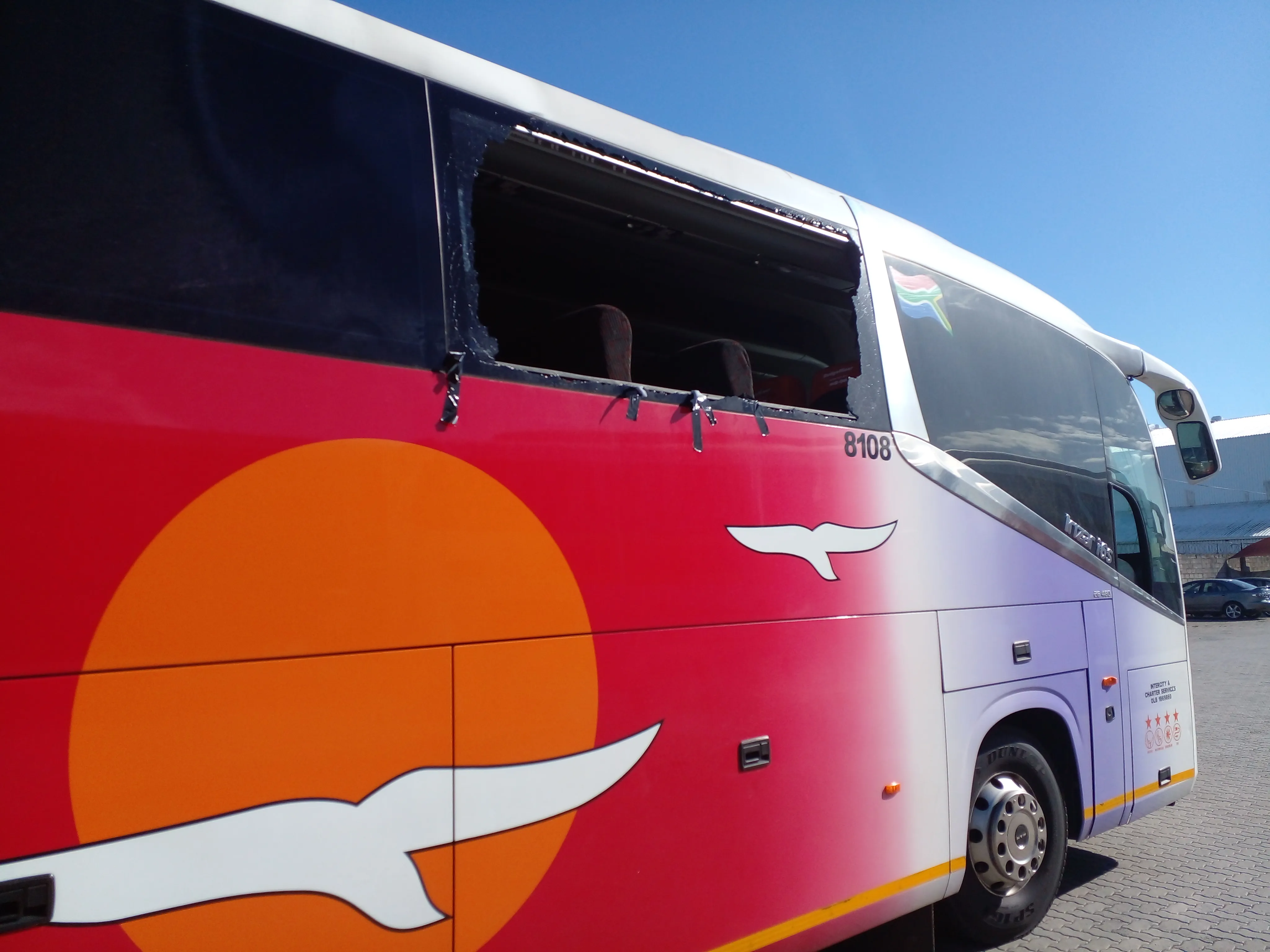
Bus operators allege that minibus taxi associations are behind the violence that has escalated in recent months. These images depict the results of incidents in the Eastern Cape and Cape Town. (Photos: Supplied)
In his affidavit he wrote, “At this meeting the taxi associations’ representatives informed us… that the only way to resolve the issues between the taxis and the buses was to agree to certain terms and conditions.
“As a starting point, the first and most important condition was that the long-distance bus operators would agree to increase their prices with immediate effect in accordance with a pricing structure which the taxi associations provided.
“In fact, the taxi associations requested us to increase our prices to R1,000 per ticket immediately but were met with heavy resistance, with the result that it was determined that prices should be increased incrementally until it reached R1,000 per ticket by the end of the year.
“Their demands — which they implement by way of extortion — dnow forces long-distance bus operators to either take part in their criminal and unlawful activities or to risk the lives of their employees, passengers and other members of the public,” said Ferreira.
Gabs Mtshala of Border Alliance told amaBhungane: “It was not price fixing. We’ve been calling the Competition Commission, we’ve been asking the Department of Transport to intervene, because… there is no way you can charge R150 from Cape Town to Joburg.
“It means that you are killing the industry.”
Collateral damage
Ferreira’s affidavit alleges that taxi associations are bullying other companies perceived to be working with the bus industry.
In a letter dated 13 July 2021 and addressed to bus operators and managers, Bryan Rufener, travel manager of bookings company Computicket, wrote: “Due to the continued unrest and protest action in various parts of the country, the staff and customer safety is our highest priority.
“It’s unfortunate, but where we deem it fit we will refrain from the sales of tickets at various locations until such time as normality is restored.”
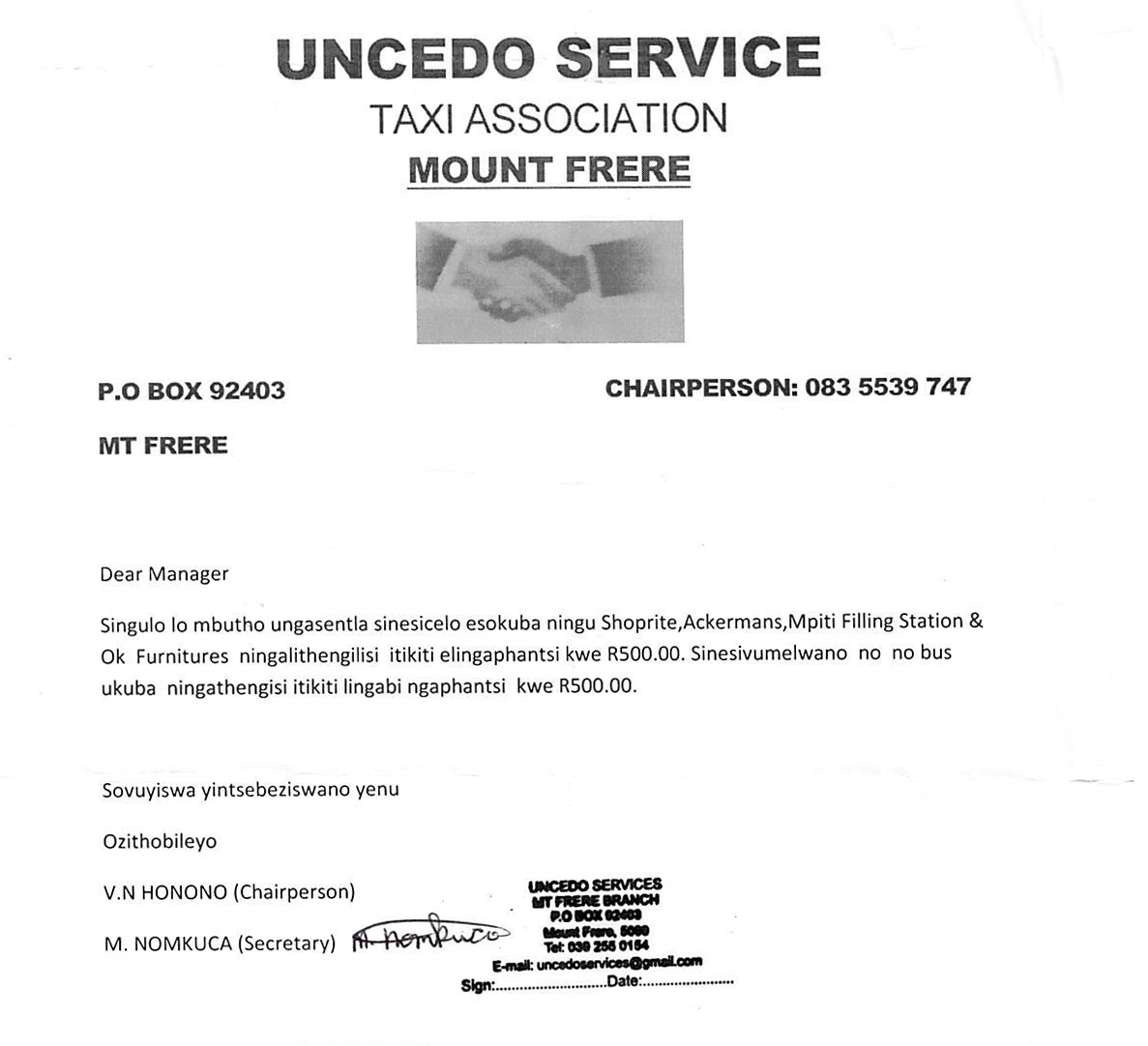
AmaBhungane has also seen a letter with a Mount Frere Taxi Association letterhead addressed to the managers of retailers Shoprite, Ackermans, OK Furniture and the Mpiti filling station, stating: “As the above mentioned association, we have a request for Shoprite, Ackermans, and OK Furniture, and the Mpiti Filling Station to no longer sell tickets that are below R500. We have an agreement with bus operators for you to cease the sale of tickets below R500”. (sic)
The association’s chairperson, VN Honono, confirmed that they wrote the letter but said they did so because they had agreed in principle with bus owners.
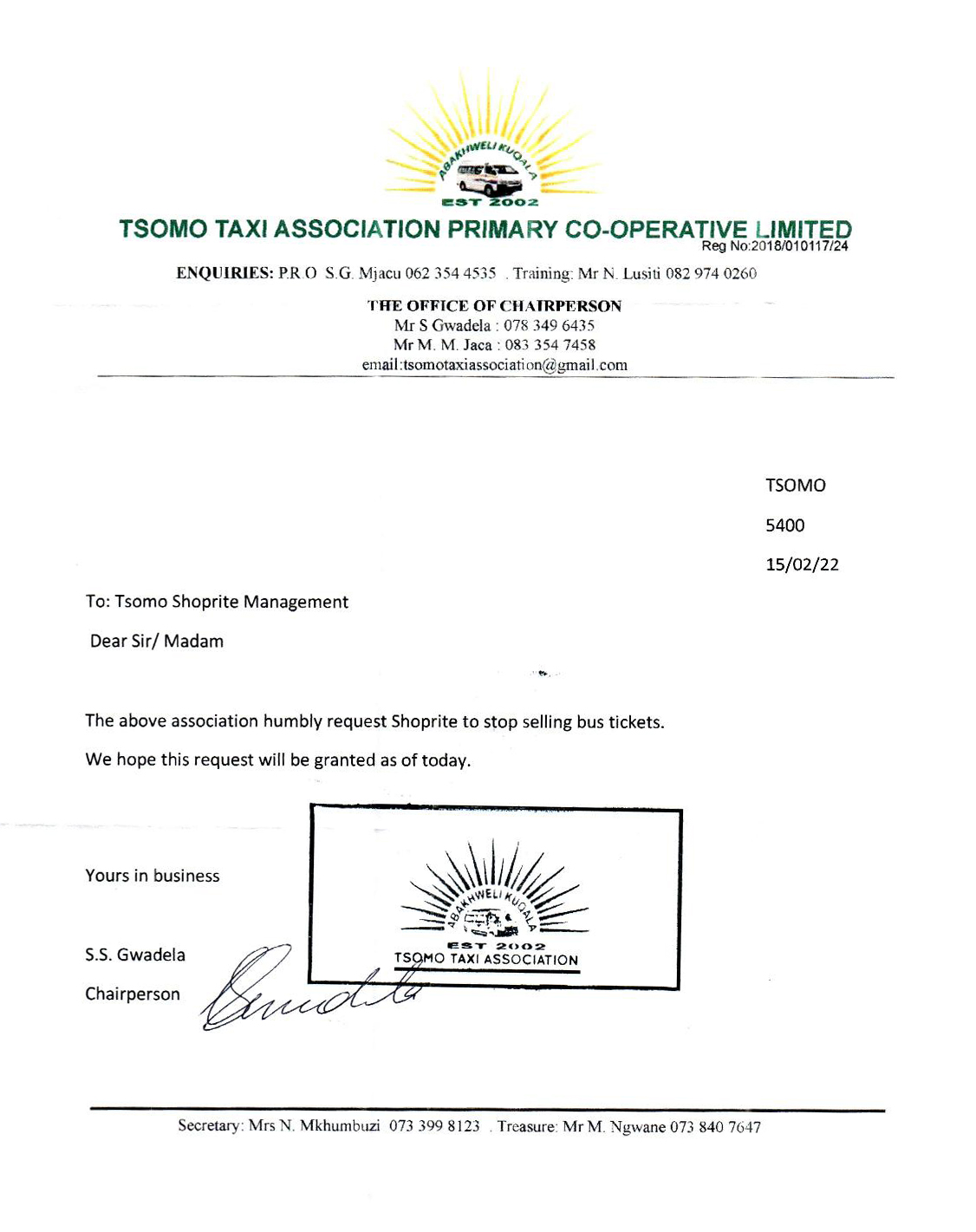
Another letter, dated 15 February 2022, and with a Tsomo Taxi Association letterhead, reads, “The above association humbly requests Shoprite to stop selling bus tickets. We hope this request will be granted as of today.”
Spokesperson for Tsomo Taxi Association, Mci Mjacu, confirmed that the association authored the letter but said they were driven by desperation.
“Our biggest gripe is that the bus operators are not from this area… we are, they come here and take our passengers and we are left with scrap. We approached them because we wanted them as a fellow local business to stand with us since we are the ones who ferry customers to them,” said Mjacu.
Yet another letter suggests that some are giving in to alleged pressure from taxi associations.
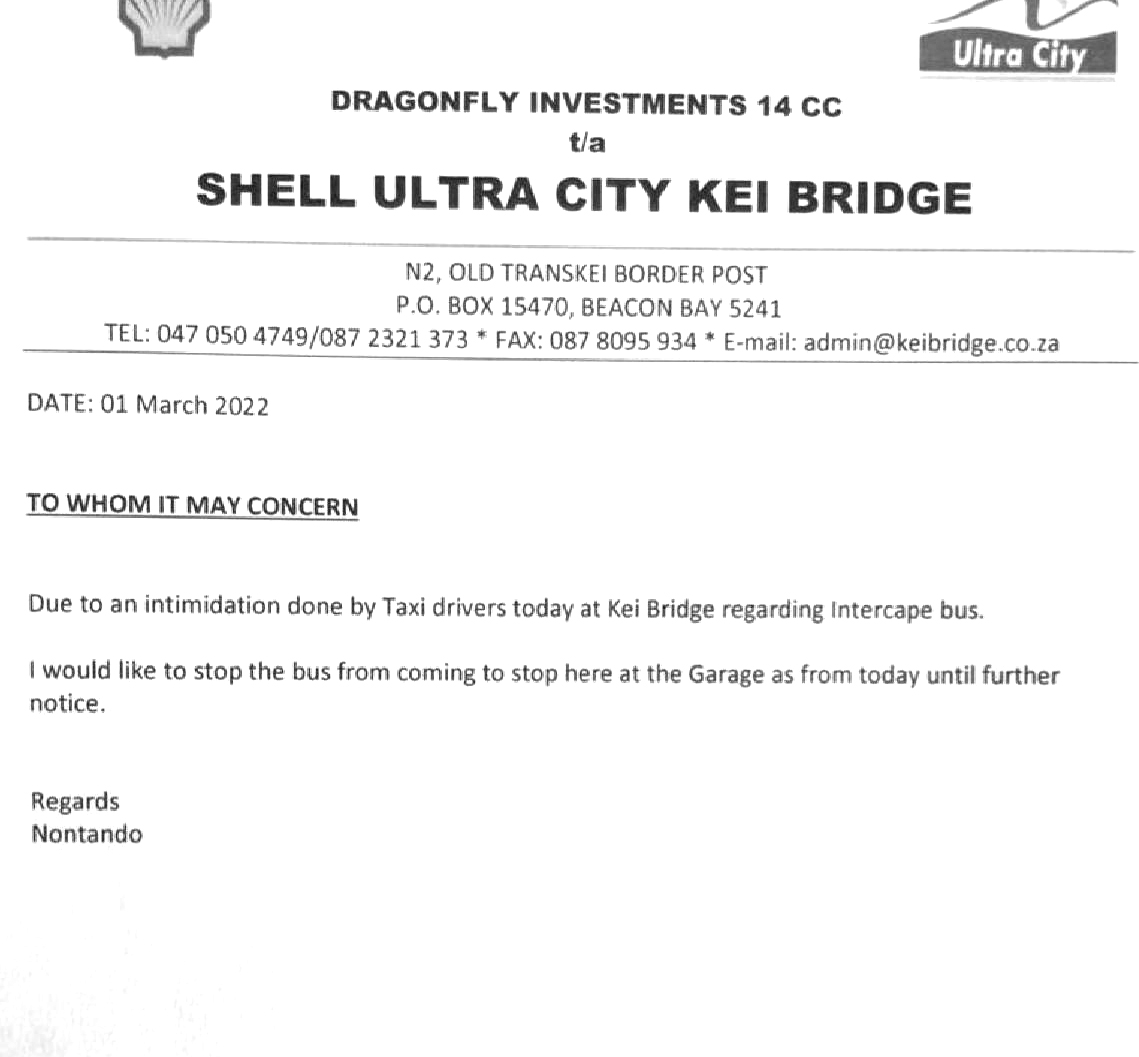
Dated 1 March 2022 with a Kei Bridge Shell letterhead and directed to Intercape, the letter states: “Due to intimidation done by taxi drivers today at Kei Bridge regarding Intercape bus, I would like to stop the bus from coming to stop here.”
Government inaction
Bus companies have criticised SAPS and the government for failing to do enough to halt the violence.
After Machana was shot on 25 April, Intercape’s lawyers wrote to the Western Cape MEC for Roads, Transport and Safety calling for urgent intervention.
The department told amaBhungane the matter was brought to the attention of the relevant authorities and local police stations recently established an extortion response team which would be deployed for rapid response.
“The relevant officials coordinated with traffic and enforcement authorities to monitor ranks and key routes with the aim of ensuring that buses have a safe passage,” the department said in a written response.
It added that the issue had been raised at the Provincial Joint Operational and Intelligence Structure and escalated to the National Joint Operational and Intelligence Structure (NatJoints) because of the nature and extent of the crimes.
It said the premier had written to the president to request an urgent meeting and coordinate intervention at national level “to combat extortion and racketeering in the public transport sector”.
Ferreira has pleaded with SAPS to take urgent action.
“This is a national crisis that needs to be addressed urgently… Should SAPS fail to combat these unlawful activities, which are escalating in severity at incredible speed, it is inevitable that more employees, passengers and innocent bystanders will become further victims of fatal incidents of taxi violence,” read his affidavit.
Ferreira told amaBhungane he found it problematic that SAPS seemed reluctant to take action.
“It surprises me why the police would encourage discussions… instead of taking a stance and making arrests. They keep telling us to reach agreements, but why must we agree to criminality?” said Ferreira.
Some respite was provided after Ferreira’s affidavit was delivered to the NatJoints chair, and police Tactical Response Teams started escorting buses in the Eastern Cape on 9 May 2022.
However, that temporary measure came to an end on 3 June and the violence erupted again. A bus travelling from Mthatha to Pretoria was shot at.
Two days later, a bus travelling from Pretoria to Umthatha was stoned.
Intercape told amaBhungane, “After the rock hit the window and narrowly missed the driver, the coach went off the road and, with the grace of God, he managed to get the bus back on the road. Fourteen passengers sustained minor injuries.” DM
Sebe Buthelezi is an Open Society Foundation Fellow at Wits University.


















This has been a long time coming taxis don’t like competition period.They are to big,I’ve been through a couple of taxi wars ,it’s all about the money!!!!
This is the anarchy we voted for. Viva, ANC, Viva! Nooooot
And one wonders who is behind the sabotaging of the rail services?
The ANC has allowed the taxi industry to become a monster that increasingly operates outside of the laws of the country. This anarchy will be the death knell of the economy. It started with the construction mafia, then quickly spread to the mining mafia and the long haul trucking mafia. Now it’s the taxi mafia. What other sectors of the economy are next in line to be disrupted by anarchists – petrol stations, hospitals, pharmacies, supermarkets – are some economic sectors vulnerable to mafia gangsters? And SAPS stands by with arms folded!